|
|
|
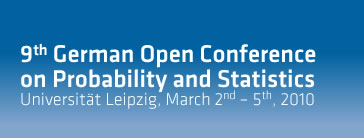 |
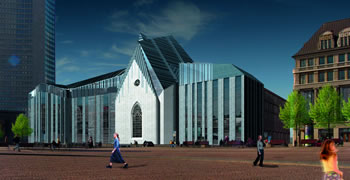 |
The ninth biannual meeting of the Probability and Statistics Group of the German Mathematicians Society (DMV) took place in Leipzig from 2 to 5 March, 2010. This meeting covers all areas of mathematical probability and statistics and has become one of Europe's big probability events. It attracted some 450 participants from all over Europe and partially also from overseas, among them the four invited plenary speakers Paul Embrechts, Michel Ledoux, Benedikt Pötscher and Michael Steele. The main body of the meeting consisted of 15 parallel sections on various areas. These sections presented an invited speaker, among them well-known scientists like Geoffrey Grimmett, Jean Bertoin and Sidney Resnick. Including all contributed talks, a total of about 300 talks were given during the four days of the meeting.
The local conditions at the host institution, the University of Leipzig, were excellent, as the meeting took place in the entirely new renovated lecture hall building, which is located in the heart of the city of Leipzig. This made it especially easy for the participants to enjoy the athmosphere of the cosmopolitan city with all its cultural offers. The conference dinner took place at the stylish restaurant "Bayerischer Bahnhof", which hosts an own brewery. The local conference organisation was efficiently handled by event lab Leipzig.
The sponsors and supporters of the meeting were the German Science Foundation (DFG), the Association of the Friends and Supporters of the University of Leipzig and the Deutsche Gesellschaft für Versicherungs- und Finanzmathematik e.V. (DGVFM). The next GOCPS will take place in early March 2012 at Mainz University.
Wolfgang König
After 24 years, the Latin American Congress of Probability and Mathematical Statistics (CLAPEM) took place again in Venezuela, from 1st to 6th of November 2009. The venue of this XIth edition was the Club Puerto Azul, a location at the beach on the central coast, not far from Caracas.
There were 169 registered participants, mostly from Latin American countries and also from the other continents.
The scientific program included eight invited plenary lectures, by Peter Bickel, Peter Bühlmann, David Donoho, Luis Gorostiza, Peter Hall, Gregory Lawler, Marta Sanz–Solé and Vladas Sidoravicius, and fifteen invited thematic sessions in different research areas of current interest within the disciplines of probability and statistics.
A thematic session organized by Jean–Marc Azais
was dedicated to Mario Wschebor, one of the organizers of the first CLAPEM, and
was devoted to the presentation of results related with the work of Wschebor
along his carrier. There were also sessions of contributed talks, a poster
session which counted with more that fifty participants, and two short courses:
• Classification and Cluster Analysis for Functional Data by Ricardo Fraiman
from Universidad de San Andrés (Argentina) and Universidad de la República
(Uruguay).
• Quasi Stationary Distributions by Servet Martínez from Universidad de Chile.
Peter Bickel gave a lecture in remembrance of Eric Lehmann. The closing session on Friday 6th consisted on the presentation and the lectures of the two recent doctors distinguished with the Francisco Aranda Ordaz award: Maria da Glória Abage de Lima, from Universidade Federal de Pernambuco (Brasil), for the thesis in statistics Essays on heteroskedasticity, supervised by Francisco Cribari, and Sebastián Grynberg from Universidad de Buenos Aires (Argentina), for the thesis in probability Construction and perfect simulation of Markov fields with bounded spines, supervised by Pablo Ferrari. The pleasant location by the sea, and the welcoming spaces of the place fostered further discussions and conversations after the scheduled activities, helping to establish links between the participants.
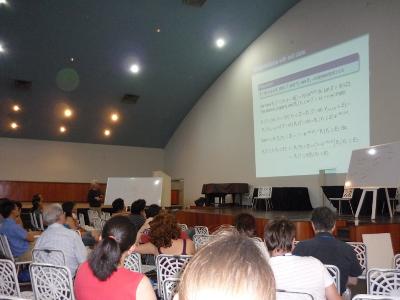 |
The event is organized every two years by the SLAPEM (Latin American Society of Probability and Mathematical Statistics), under the auspices of the Bernoulli Society, the IMS and ISI. Financial support was provided by several Venezuelan institutions: Fondo Nacional de Ciencia Tecnología e Innovación, Instituto Venezolano de Investigaciones Científicas, and Universidad Central de Venezuela, and also by the Bernouli Society and the National Institutes of Health (USA). The program book, including the abstracts of the works presented is available at the web site of the conference: http://www.cesma.usb.ve/xiclapem/
Stella Brassesco, Caracas
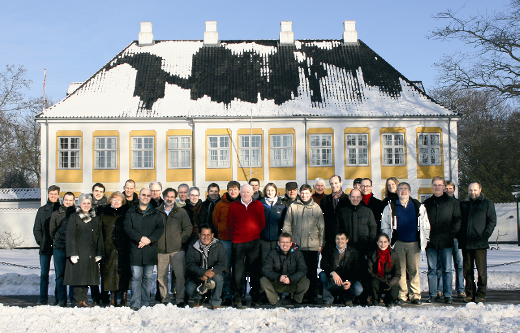 |
An international exploratory workshop on “Ambit processes, non-semimartingales and applications” was held at the Aarhus University Conference Centre Sandbjerg, Sřnderborg, Denmark, from 24-28 January 2010.
The workshop, which was exploratory in nature, addressed recent developments in the theory and applications of ambit processes. Ambit processes form a general class of processes for tempo-spatial modelling, but have interesting and non-trivial aspects already in the purely temporal case. Ambit processes are generally not of the semimartingale type, and the subject of ambit processes thereby links closely to another topic of substantial current interest, that of properties and applicability of non-semimartingales. For the study and solution of key problems in the fields concerned the newly established results on multipower variation and on central limit theory based on Malliavin calculus are essential and were presented at the meeting. Furthermore, applications to turbulence, finance and cell growth were discussed.
About 45 people participated in the workshop which comprised a number of survey talks, given by Ole E. Barndorff-Nielsen (Ambit processes), Mark Podolskij (Multipower variation), José-Manuel Corcuera (Central limit theorems in Malliavin calculus), Jan Rosinski (Infinite divisibility), Albert Shiryaev (On the evolution of the von Mises’ notion of randomness), Jürgen Schmiegel (Turbulence) and Fred Espen Benth (Ambit processes in energy markets). Furthermore, there were 17 invited talks and also a number of excellent poster presentations given by the junior workshop participants. These presentations as well as the talks gave rise to lively discussions.
The workshop was organised under the auspices of the Bernoulli Society and has been supported financially by CREATES (Centre for Research in Econometric Analysis of Time Series, funded by the Danish National Research Foundation), by the Thiele Centre for Applied Mathematics in Natural Science (both at Aarhus University) and by the Danish Council for Independent Research in the Social Sciences (FSE).
Detailed information is available at http://www.ambitprocesses.au.dk/
Ole E. Barndorff-Nielsen, Aarhus
José-Manuel Corcuera, Barcelona
Jürgen Schmiegel, Aarhus
Almut Veraart, Aarhus
On 12 – 6.09.2009, a summer academy on stochastic geometry, spatial statistics and random fields (www.uni-ulm.de/summeracademy09) took place at Söllerhaus, an Alpine conference center of the University of Stuttgart and RWTH Aachen in the picturesque village Hirschegg (Austria) near the German border. It was organized by the Institute of Stochastics of Ulm University in cooperation with the Chair of Probability Theory of Lomonossov Moscow State University.
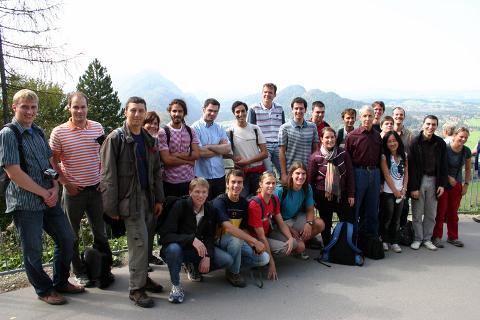 |
In contrast to previous schools on this subject (Sandbjerg 2000, Martina Franca 2004, Sandbjerg 2007), this summer academy concentrated on topics such as the asymptotic theory of random sets, fields and geometric graphs that had not been touched upon before. At the same time, it provided an introduction spatial statistics, giving (post)graduate students an opportunity to start their own research within a couple of weeks.
The summer academy hosted 38 young participants from 13 countries (Australia, Austria, Denmark, Germany, France, Mongolia, Russia, Romania, Sweden, Switzerland, UK and USA). The generous financial support provided by the International Office of the German Academic Exchange Service (DAAD) and Ulm University allowed to cover the local and travel expenses of the majority of students. Twelve international leading scientists gave lectures on various fields of geometry, probability theory and mathematical statistics. Moreover, students and young researchers had the possibility to give their own short talks. Coffee breaks and evening discussions provided an inspiring framework for an intensive exchange of ideas, new contacts and possible joint research projects. Additionally, mountain hiking and visits to neighbouring German cities (Bavarian royal castle Neuschwanstein and Lindau) rounded the intense scientific program.
The special lecture volume of this summer academy is planned to be published in the ‘’Lecture Notes in Mathematics’’ series of Springer Verlag.
E. Spodarev, organizer (Ulm University)